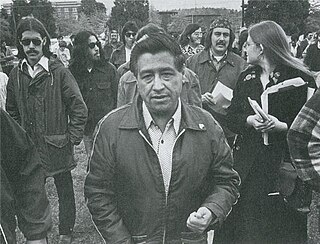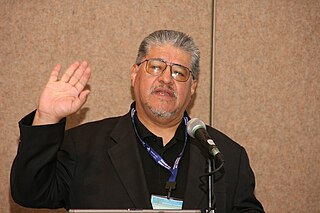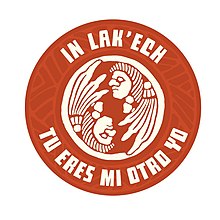
Chicano or Chicana is an ethnic identity for Mexican Americans that emerged from the Chicano Movement. Chicano was originally a classist and racist slur used toward low-income Mexicans that was reclaimed in the 1940s among youth who belonged to the Pachuco and Pachuca subculture.

M.E.Ch.A. is a US-based organization that seeks to promote Chicano unity and empowerment through political action.
Ethnic studies, in the United States, is the interdisciplinary study of difference—chiefly race, ethnicity, and nation, but also sexuality, gender, and other such markings—and power, as expressed by the state, by civil society, and by individuals.
Latino studies is an academic discipline which studies the experience of people of Latin American ancestry in the United States. Closely related to other ethnic studies disciplines such as African-American studies, Asian American studies, and Native American studies, Latino studies critically examines the history, culture, politics, issues, sociology, spirituality (Indigenous) and experiences of Latino people. Drawing from numerous disciplines such as sociology, history, literature, political science, religious studies and gender studies, Latino studies scholars consider a variety of perspectives and employ diverse analytical tools in their work.

Chicanismo emerged as the cultural consciousness behind the Chicano Movement. The central aspect of Chicanismo is the identification of Chicanos with their Indigenous American roots to create an affinity with the notion that they are native to the land rather than immigrants. Chicanismo brought a new sense of nationalism for Chicanos that extended the notion of family to all Chicano people. Barrios, or working-class neighborhoods, became the cultural hubs for the people. It created a symbolic connection to the ancestral ties of Mesoamerica and the Nahuatl language through the situating of Aztlán, the ancestral home of the Aztecs, in the southwestern United States. Chicanismo also rejects Americanization and assimilation as a form of cultural destruction of the Chicano people, fostering notions of Brown Pride. Xicanisma has been referred to as an extension of Chicanismo.

The Chicano Movement, also referred to as El Movimiento, was a social and political movement in the United States that worked to embrace a Chicano/a identity and worldview that combated structural racism, encouraged cultural revitalization, and achieved community empowerment by rejecting assimilation. Chicanos also expressed solidarity and defined their culture through the development of Chicano art during El Movimiento, and stood firm in preserving their religion.

Luis Miguel Valdez is an American playwright, screenwriter, film director and actor. Regarded as the father of Chicano film and playwriting, Valdez is best known for his play Zoot Suit, his movie La Bamba, and his creation of El Teatro Campesino. A pioneer in the Chicano Movement, Valdez broadened the scope of theatre and arts of the Chicano community.

Chicana feminism is a sociopolitical movement, theory, and praxis that scrutinizes the historical, cultural, spiritual, educational, and economic intersections impacting Chicanas and the Chicana/o community in the United States. Chicana feminism empowers women to challenge institutionalized social norms and regards anyone a feminist who fights for the end of women's oppression in the community.

Chicano poetry is a subgenre of Chicano literature that stems from the cultural consciousness developed in the Chicano Movement. Chicano poetry has its roots in the reclamation of Chicana/o as an identity of empowerment rather than denigration. As a literary field, Chicano poetry emerged in the 1960s and formed its own independent literary current and voice.

Chicano studies, also known as Chicano/a studies, Chican@ studies, or Xicano studies originates from the Chicano Movement of the late 1960s and 1970s, and is the study of the Chicano and Latino experience. Chicano studies draws upon a variety of fields, including history, sociology, the arts, and Chicano literature. The area of studies additionally emphasizes the importance of Chicano educational materials taught by Chicano educators for Chicano students.
The National Association for Chicana and Chicano Studies (NACCS) is "the academic organization that serves academic programs, departments and research centers that focus on issues pertaining to Mexican Americans, Chicana/os, and Latina/os." Unlike many professional academic associations, NACCS "rejects mainstream research, which promotes an integrationist perspective that emphasizes consensus, assimilation, and legitimization of societal institutions. NACCS promotes research that directly confronts structures of inequality based on class, race and gender privileges in U.S. society." The association is based in San Jose, California.

Lorna Dee Cervantes is an American poet and activist, who is considered one of the greatest figures in Chicano poetry. She has been described by Alurista as "probably the best Chicana poet active today."

Borderlands/La Frontera: The New Mestiza is a 1987 semi-autobiographical work by Gloria E. Anzaldúa that examines the Chicano and Latino experience through the lens of issues such as gender, identity, race, and colonialism. Borderlands is considered to be Anzaldúa’s most well-known work and a pioneering piece of Chicana literature.

The Chicano Art Movement represents groundbreaking movements by Mexican-American artists to establish a unique artistic identity in the United States. Much of the art and the artists creating Chicano Art were heavily influenced by Chicano Movement which began in the 1960s.

Precious Knowledge is a 2011 educational and political documentary that centers on the banning of the Mexican-American Studies (MAS) Program in the Tucson Unified School District of Arizona. The documentary was directed by Ari Luis Palos and produced by Eren Isabel McGinnis, the founders of Dos Vatos Productions.

The Mexican American Studies Department Programs (MAS) provide courses for students attending various elementary, middle, and high schools within the Tucson Unified School District (TUSD). Some key components of the MAS program include student support, curriculum content, teacher professional development, and parent and community involvement. In the past, programs helped Chicana/o and Latina/o students graduate, pursue higher education, and score higher test scores. A study found that "100 percent of those students enrolled in Mexican-American studies classes at Tucson High were graduating, and 85 percent were going on to college."
Santa Barraza is an American mixed-media artist and painter who is well known for her colorful, retablo style painting. A Chicana, Barraza pulls inspiration from her own mestiza ancestry and from pre-Columbian art. Barraza is considered to be an important artist in the Chicano art movement. The first scholarly treatment of a Chicana artist is about her and is called Santa Barraza, Artist of the Borderlands, which describes her life and body of work. Barraza's work is collected by the Mexic-Arte Museum, and other museums around the United States and internationally. She currently lives in Kingsville, Texas.

Xicanx is an English-language gender-neutral neologism and identity referring to people of Mexican descent in the United States. The ⟨-x⟩ suffix replaces the ⟨-o/-a⟩ ending of Chicano and Chicana that are typical of grammatical gender in Spanish. The term references a connection to Indigeneity, decolonial consciousness, inclusion of genders outside the Western gender binary imposed through colonialism, and transnationality. In contrast, most Latinos tend to define themselves in nationalist terms, such as by a Latin American country of origin.
A Mexican American is a resident of the United States who is of Mexican descent. Mexican American-related topics include the following:

Chicano literature is an aspect of Mexican-American literature that emerged from the cultural consciousness developed in the Chicano Movement. Chicano literature formed out of the political and cultural struggle of Chicana/os to develop a political foundation and identity that rejected Anglo-American hegemony. This literature embraced the pre-Columbian roots of Mexican-Americans, especially those who identify as Chicana/os.














